5 Years Since Sandy: Were The Promises Fulfilled?
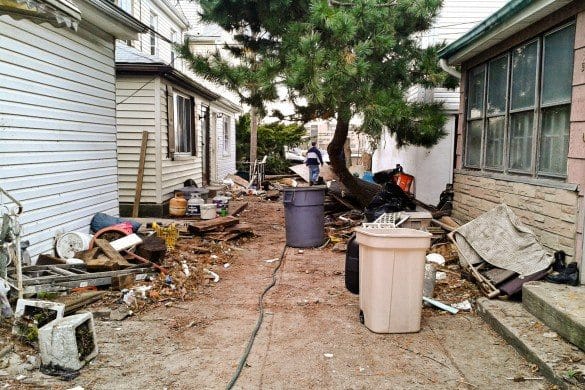
BROOKLYN – After seeing the horrendous effects of the storm, the city made a list of promises to fulfill in the five years following Sandy.
Those goals were listed in a comprehensive plan, A Stronger, More Resilient New York (SIRR). According to the city website, the plan includes “actionable recommendations both for rebuilding the communities impacted by Sandy and increasing the resilience of infrastructure and buildings citywide.”
SIRR included initiatives put into play by former mayor Michael Bloomberg. When the current mayor, Bill de Blasio, took office, the previous initiatives were moved into a new planning book, OneNYC. OneNYC includes the same promises, as well as other initiatives to achieve in the future, and the progress of the city.
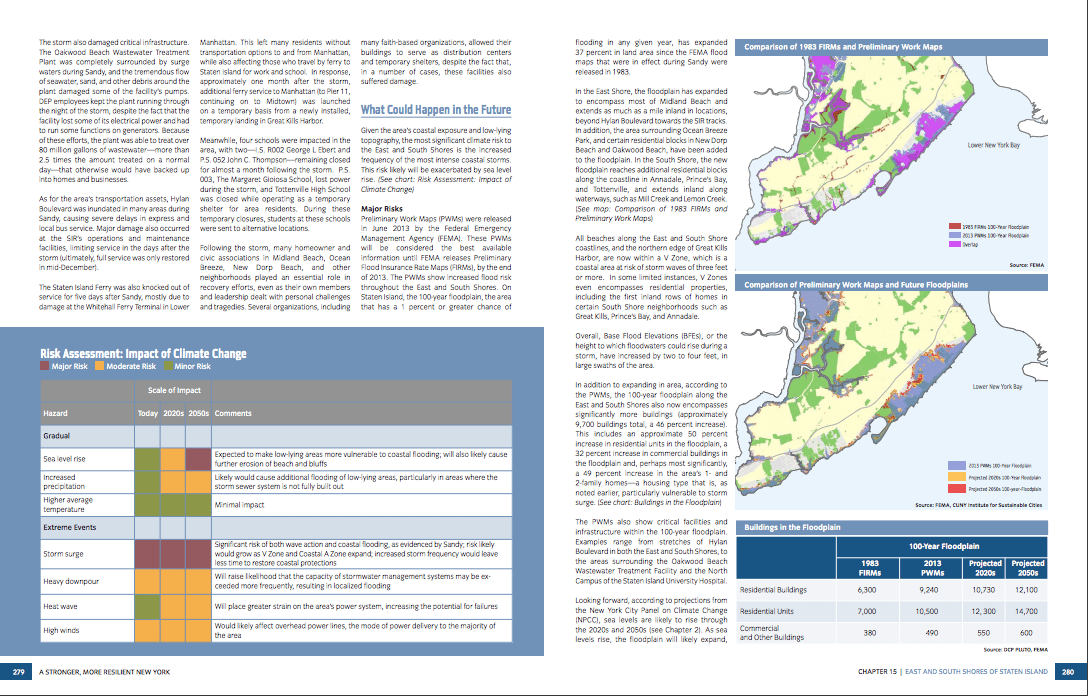
The five years are up, and we wanted to see if the promises have indeed been fulfilled. Though some of the initiatives were fully completed, many others still have yet to be done, and many of the initiatives and work to be done is worded in such ways that it is very unclear what, if anything, has been accomplished.
It was beyond our resources at this time to discuss the effectiveness of what the money has been spent on – are the Sheepshead Bay businesses more organized for having the Chamber of Commerce organize Summer strolls? Is five years to wait for repairs on sewers to begin in Stephens Court an adequate response time? Is the fact that Sheepshead Bay does not seem to have an evacuation plan in case of a storm 5 years after the worst one acceptable? But we will be asking those questions one at a time all next year and the year after that, until our communities are indeed stronger and more resilient.
Take a look for yourself. Many deadlines listed are for the end of 2017, so we will be following up in January. Do email us your thoughts and comments at editor@bklyner.com, and we will gladly take any and all help with keeping the authorities accountable on this.
To make it easier to understand, we’ve split the promises into their individual sections: neighborhoods, buildings, telecommunication, insurance, utilities, transportation, waste +wastewater, liquid fuels, parks, environmental protection + food supplies, coastal defense, & healthcare. The information is all taken from OneNYC.
Each section is separated by a photo, to take you back five years ago.
NEIGHBORHOODS
| Initiative | Milestones to complete by December 31, 2016 | 2016 milestone status | Milestones to complete by December 31, 2017 |
| Launch pilot program to identify and address gaps in community capacity | Complete pilot assessment and select target neighborhood(s)
|
Completed | Subject to available funding, implement program to address gaps in target neighborhoods |
| Explore improved approaches for mapping future flood risks, incorporating sea level rise | Input on additional recommendations for the next Technical Mapping Advisory Committee (TMAC) annual report | Completed | Host a workshop with the City, FEMA, and the NPCC to define the parameters of a future flood map product for NYC |
| Launch energy infrastructure resiliency competition
|
› Register small businesses to participate in the program
› Execute agreements with technology providers › Kickoff project implementation to install resilient technologies at Sandy-impacted small businesses across NYC |
Completed | › Continue project rollout— installing resilient technologies at Sandy-impacted small businesses across NYC
› Complete first technology installations at small business sites › Begin environmental review for remaining projects |
| Continue and expand NYCEM’s Community Emergency Response Teams (CERT)
|
Train all New York City based AmeriCorps Volunteers in Commodity Distribution Plan (CDP) operations
|
Completed | › Train 400 additional New York City based AmeriCorps Volunteers and a contingent of CERT team members in CDP operations
› Continue to engage NYCHA residents in the CERT program ›Expand on training and leadership opportunities for a wider range of CERT volunteers |
| Expand the Worker Connect information technology tool to serve as an Emergency Services Portal
|
Reconsidered | ||
| Explore the creation of a new online Emergency Notification Contact System
|
Completed | ||
| Launch a competition to increase flood resiliency in building systems | › Register small businesses to participate in the program
› Execute agreements with technology providers › Kickoff project implementation to install resilient technologies at Sandy-impacted small businesses across NYC
|
Completed | › Continue project rollout by installing resilient technologies at Sandy-impacted small businesses across NYC
› Complete first technology installations at small business sites › Begin environmental review for remaining projects |
| Launch business recovery and resiliency programs | › Make resiliency resources accessible to businesses across the city by posting online
› Continue providing Business PREP assessments and microgrants in high-risk areas, with a target of 520 businesses served by June 2018*
|
Completed | › Assess gaps and identify additional online resources needed to support small business resiliency in NYC*
› Continue providing Business PREP assessments and microgrants in high-risk areas, with a target of 520 businesses served by September 2019 |
| Launch Neighborhood Retail Recovery Program | Launch Cap Access before the end of 2016
|
Completed | Launch Cap Access before the end of 2016
|
| Support local merchants in improving and promoting local commercial corridors | Empower CBOs and Business Improvement Districts (BIDs) to support businesses by conducting train the trainer sessions
|
Completed | Communication and coordination along commercial corridors on resiliency measures
|
| Continue to support the FRESH program to increase the number of full-line grocers in underserved neighborhoods
|
Open four additional approved projects for business
|
Partially complete | Approve additional projects for FRESH benefits and open approved stores*
|
| Support private investments that reduce flood risk along Newtown Creek
|
› Provide additional workshops for businesses to better understand resiliency measures and begin providing on-site resiliency assessments and micro-grants to businesses through Business PREP
›Continue assistance in the permitting process for the restoration and upgrade of bulkheads |
Completed | › Continue to provide on-site resiliency assessments, micro-grants, and other potential resiliency financing opportunities to businesses through Business PREP
› Continue assistance in the permitting process for the restoration and upgrade of bulkheads |
| Create and implement a revitalization strategy for targeted retail and community spaces within Red Hook Houses | Initiate construction on current and new retail at the Red Hook Houses
|
Delayed | Initiate construction of current and new retail at the Red Hook Houses
|
| Work with Brooklyn Chamber of Commerce to assist in organizing Sheepshead Bay businesses | Organize the Third Annual Sheepshead Summer Stroll
|
Completed | |
| Support area recovery through the rebuilding and expansion of the entertainment district | Complete and open new amphitheater and open spaces in entertainment district
|
Completed | Kick-off new phases of sewer infrastructure
|
| Launch a pilot program to identify and test strategies for protecting vulnerable neighborhoods from extreme heat health impacts
|
Identify near-term tactics for the city’s most heat-vulnerable communities and identify funding to develop pilot program
|
Delayed | Subject to available funding, implement program in target neighborhood
|
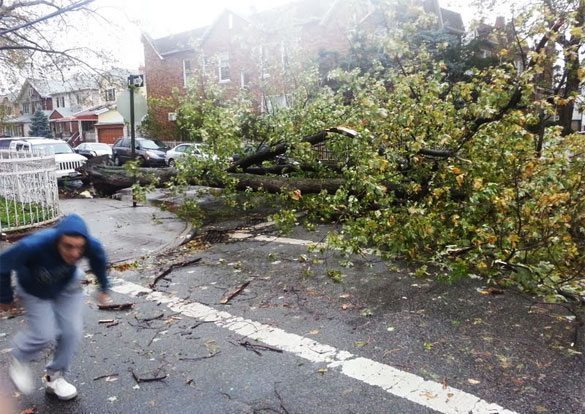
BUILDINGS
| Initiative | Milestones to complete by December 31, 2016 | 2016 milestone status | Milestones to complete by December 31, 2017 |
| Rebuild and repair housing units destroyed and substantially damaged by Sandy | Complete the Build it Back Single-Family program
|
Partially complete | Advance portfolio and serve all homeowners
|
| Retrofit public housing units damaged by Sandy and increase future resiliency | Complete design on all 33 Sandy-damaged developments and start construction at all sites
|
Partially complete | Advance NYCHA’s Sandy Recovery Program
|
| Study additional resiliency initiatives for ground-floor housing within NYCHA buildings
|
Complete design on all 33 Sandy-damaged developments, including resiliency efforts to protect ground floor housing
|
Partially complete | Start construction at all Sandy developments by the end of the year
|
| Improve regulations for flood resiliency of new and substantially improved buildings in the 100-year floodplain
|
Begin environmental review for local and citywide zoning changes
|
Partially complete | Ensure adoption of local and citywide zoning changes
|
| Study and implement zoning changes to encourage retrofits of existing buildings and construction of new resilient buildings in the 100- year floodplain
|
Begin environmental review for local and citywide zoning changes
|
Partially complete | Ensure adoption of initial local zoning changes and develop initial draft proposal for citywide zoning changes.
|
| Work with New York State to identify eligible communities for the New York Smart Home Buyout Program
|
Execute a memorandum of understanding between the City, the Nature Conservancy, and United States Department of Agriculture Natural Resources Conservation Service (USDA-NRCS) to ensure the permanent protection of key vulnerable properties from future development
|
Completed | Continue to coordinate with GOSR to develop a long-term land use strategy for state buyout properties
|
| Amend the Building Code and complete studies to improve wind resiliency for new and substantially improved buildings
|
Start the wind study
|
Completed | Advance the wind study |
| Encourage existing buildings in the 100- year floodplain to adopt flood resiliency measures through an incentive program and targeted requirements
|
Conduct analysis to determine the number of target households, describe potential program structures, and identify financing models that could be employed to incentivize risk reduction for individual homeowners
|
Completed | Launch a NYC Resiliency Fund program to fund mitigation for existing buildings through private and/or non-profit partners
|
| Amend the Building Code to improve wind resiliency for existing buildings and complete studies of potential retrofits
|
Start the wind study | Completed | Advance the wind study |
| Support CUNY launch of study and pilot of new technologies for high-rise buildings
|
› Define parameters and create model for the Resilient Solar calculator through Sustainable CUNY
› Continue to support solar CUNY’s ongoing projects
|
Completed | › Work with CUNY to determine implementation plan following publication of Resilient Solar Roadmap
› Secure funding for CUNY full-time equivalent (FTE) to act as energy storage ombudsman to oversee energy storage permitting process improvements › Continue to support solar CUNY’s ongoing projects
|
| Study options to ensure resiliency of private cogeneration facilities in the area
|
Participate in the DOE CHP for Resiliency Accelerator Initiative
|
Completed | Identify approaches to enhance resiliency of cogeneration facilities
|
| Work with FEMA to improve the flood mapping process
|
Provide additional recommendations for the next Technical Mapping Advisory Committee (TMAC) annual report
|
Completed | Work with FEMA to continue the update of the current and future floodplain map as detailed in the appeal
|
| Work with FEMA to improve the communication of current flood risks
|
Continue to advocate for improved flood risk communication through, among other initiatives, a further updated alternative flood risk communication tool developed by CNYCN and ongoing participation on FEMA’s Technical Mapping Advisory Council
|
Completed | Continue to advocate to improve current and future flood risk communication
|
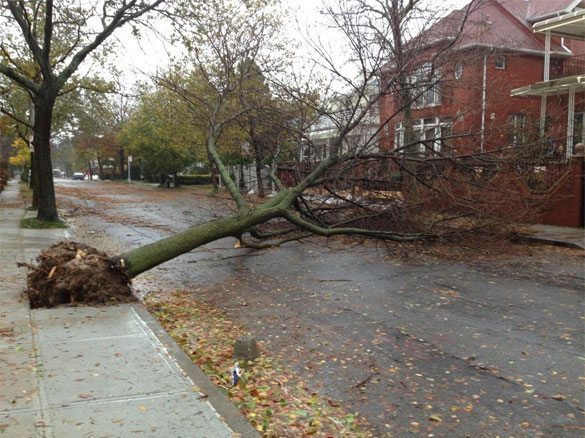
INSURANCE
| Initiative | Milestones to complete by December 31, 2016 | 2016 milestone status | Milestones to complete by December 31, 2017 |
| Support Federal efforts to address affordability issues related to reform of the NFIP
|
› Complete 1-4 Family Flood Insurance Affordability Study
› Continue to participate in NFIP advocacy, emphasizing key affordability and mitigation concerns central to NYC
|
Completed | |
| Develop FEMA endorsed flood protection standards and certifications for existing urban buildings
|
Review and disseminate information pertaining to the second phase of FEMA guidance on buildings that cannot be elevated to be released in 2016
|
Partially complete | Review and disseminate information pertaining to the second phase of FEMA guidance on buildings that cannot be elevated to be released in 2017
|
| Call on FEMA to recognize mixed-use buildings as a distinct building category
|
Continue to advocate for mixed-use to be recognized as a distinct category
|
Completed | Urge Congress to reauthorize the NFIP with NYC’s key concerns, including the recognition of mixed-use buildings as a distinct category
|
| Call on FEMA to develop mitigation credits for resiliency measures
|
FEMA to release the second phase of the work that informed the September 2015 guidance for buildings that cannot be elevated pursuant to Section 26 of the Homeowner Flood Insurance Affordability Act
|
Partially complete | FEMA to release the second phase of the work that informed the September 2015 guidance for buildings that cannot be elevated pursuant to Section 26 of the Homeowner Flood Insurance Affordability Act
|
| Study approaches for New York City to join FEMA’s Community Rating System (CRS) program
|
Analyze the costs and benefits of entering the CRS program, based on the results of the CAV
|
Partially complete | Analyze the costs and benefits of entering the CRS program, based on the results of the CAV
|
| Call on New York State to improve policyholder awareness at the point of sale or renewal
|
Analyze the costs and benefits of entering the CRS program, based on the results of the CAV
|
Partially complete | Continue to advocate for improved policy awareness at the point of sale
|
| Launch a consumer education campaign on flood insurance
|
Run consumer education program in at-risk neighborhoods to increase knowledge of flood risk, mitigate the risk, and buy flood insurance
|
Completed | |
| Launch an engagement campaign targeting insurers
|
Host a meeting with key insurance stakeholders to explain the steps NYC is taking to mitigate risk
|
Completed |
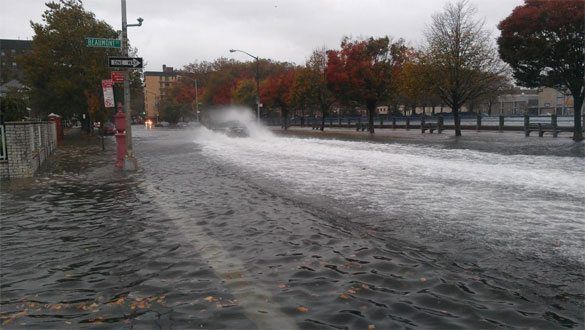
UTILITIES
| Initiative | Milestones to complete by December 31, 2016 | 2016 milestone status
|
Milestones to complete by December 31, 2017 |
| Work with utilities and regulators to reflect climate risks in system design and equipment standards
|
Continue to work with utilities through the Climate Change Adaptation Task Force
|
Completed | Continue to work with utilities through the Climate Change Adaptation Task Force, regulatory processes and through regular meetings
|
| Work with power suppliers and regulators to harden key power generators against flooding
|
Continue to work with power generators through the Climate Change Adaptation Task Force
|
Completed | Identify work plan to address remaining gaps
|
| Work with industry partners, New York State, and regulators to strengthen New York City’s power supply
|
Continue to explore other opportunities to expand and diversify transmission and power generation sources
|
Completed | Continue to explore other opportunities to expand and diversify transmission and power generation sources
|
| Work with Con Edison and the PSC to develop a long-term resiliency plan for the electric distribution system
|
› Reduce load by anticipated goal of 12 MW through the Brooklyn Queens Demand Management project
› Continue to participate in REV proceedings
|
Completed | Complete first chapter of Con Edison climate change vulnerability study
|
| Work with utilities and regulators to implement smart grid technology to assess system conditions in real time
|
Participate in Con Edison rate case proceedings
|
Completed | |
| Work with utilities and regulators to speed up service restoration for critical customers via system configuration
|
Work with Con Edison and LIPA/PSEG to ensure timely restoration of power to critical customers
|
Completed | Work with Con Edison and LIPA/PSEG to ensure timely restoration of power to critical customers
|
| Work with utilities and regulators to speed up service restoration via pre-connections for mobile substations
|
Participate in Con Edison rate case proceedings
|
Completed | Finalize Con Edison rate case plan
|
| Work with utilities and regulators to strengthen the in-city gas transmission and distribution system
|
› Commence study to better understand the constraints, resiliency, and safety issues related to the in-city gas transmission and distribution systems
› Continue to coordinate with the utilities on joint bidding program
|
Reconsidered
Completed |
Participate in the National Grid Storm Hardening Collaborative
|
| Work with utilities and regulators to expand citywide demand response programs
|
City to support full implementation of NYISO’s demand response program
|
Completed | Evaluate and determine whether updated demand response goals are needed
|
| Work with public and private partners to scale up distributed generation (DG) and micro-grids
|
› Administer the first set of Solarize NYC campaigns
› Continue to work to streamline the solar permitting process
|
Completed | Completed |
| Incorporate resiliency into the design of City electric vehicle initiatives and pilot storage technologies
|
Continue to participate in the NYSERDA study
|
Completed | |
| Work with utilities and regulators to develop a cost-effective system upgrade plan to address climate risks
|
› Work with LIPA/PSEG to develop a resiliency approach for the Rockaways
› Participate in National Grid rate case proceedings › Con Edison to complete the first chapter of its climate change vulnerability study
|
Completed
Completed Delayed |
› Participate in the National Grid Storm Hardening Collaborative
|
| Work with utilities and the PSC to harden key electric transmission and distribution infrastructure against flooding
|
Work with LIPA/PSEG to develop a resiliency approach for the Rockaways
|
Completed | Continue to work with National Grid on their storm hardening collaborative
|
| Work with utilities and the PSC to harden vulnerable overhead lines against winds
|
› Continue to work with Con Edison and LIPA/PSEG to complete the hardening of overhead distribution
› Examine if any gaps remain once the hardening of overhead distribution is complete
|
Completed
Partially complete |
Develop a plan to address any remaining sites that require hardening
|
| Work with utilities, regulators, and gas pipeline operators to harden the natural gas system against flooding
|
› Participate in National Grid rate case proceedings
› Work with Con Edison and National Grid to further ensure the safety and resiliency of gas mains
|
Completed | Participate in the National Grid Storm Hardening Collaborative
|
| Work with steam plant operators and the PSC to harden steam plants against flooding
|
Complete all generating station projects
|
Completed | |
| Work with utilities and regulators to minimize electric outages in areas not directly affected by climate impacts
|
Work with Con Edison and LIPA/PSEG to identify other opportunities to minimize electric outages
|
Completed | Work with Con Edison and LIPA/PSEG to identify other opportunities to minimize electric outages
|
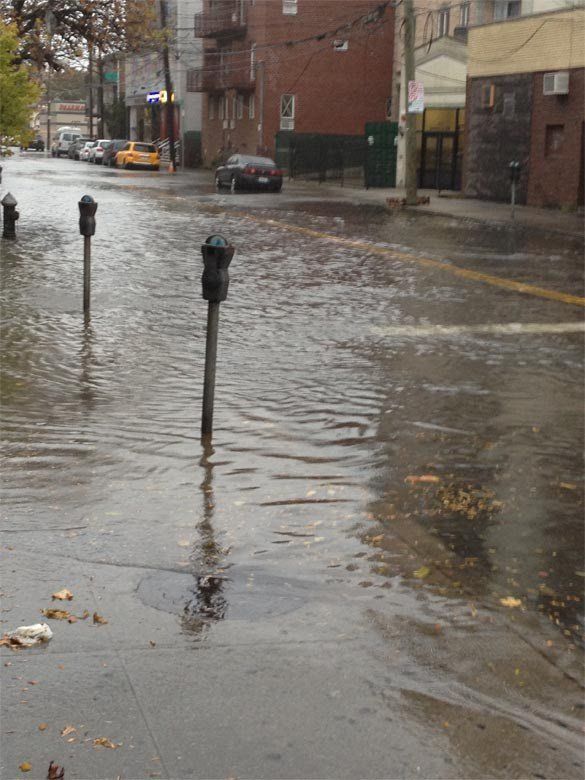
TELECOMMUNICATION
| Initiative | Milestones to complete by December 31, 2016
|
2016 milestone status
|
Milestones to complete by December 31, 2017
|
| Establish new resiliency requirements for providers using scheduled renewals of the City’s franchise agreements
|
› Develop proposals focused on resiliency for use in negotiating major franchise renewals that are up in 2020
› Continue to negotiate for resiliency terms in other agreements as they are renewed or established in coming years
|
Completed | › Continue to negotiate for resiliency terms in other agreements as they are renewed or established in coming years
|
| Develop flood protection standards for placement of telecommunications equipment in buildings
|
Continue to explore opportunities to improve the resiliency of telecommunication infrastructure in buildings
|
Completed | Continue to explore opportunities to improve the resiliency of telecommunication infrastructure in buildings
|
| Use the DoITT franchise agreements to ensure hardening of all critical facilities
|
› Review resiliency status report submitted by PCS franchisee pursuant to its franchise agreement
› Continue TPRO site visits to observe resiliency measures at franchisee and other telecom providers’ facilities serving the city
|
Completed | Request state of technology reports pursuant to franchise agreements
|
| Work with cell providers to encourage hardening of cell sites
|
› Update on the status of a wireless carrier’s deployment of alternative fuel source option for backup power
› Continue TPRO site visits to observe resiliency measures at wireless providers’ facilities serving NYC
|
Completed | Continue working with wireless carriers to ensure cell sites and networks are hardened and resilient and assisting in clearing any barriers to implementation within the City to include ongoing communications and dialogue with City officials
|
| Study options to increase conduit infrastructure redundancy and resiliency
|
› Collect conduit maps from all conduit infrastructure providers
› Work with ECS to ensure that its inventory and management tools allow the City to track and monitor availability and effective use of spare conduit
|
Partially completed
Completed |
Explore further options, based on maps and information provided, for improving the availability and redundancy of conduit in the city
|
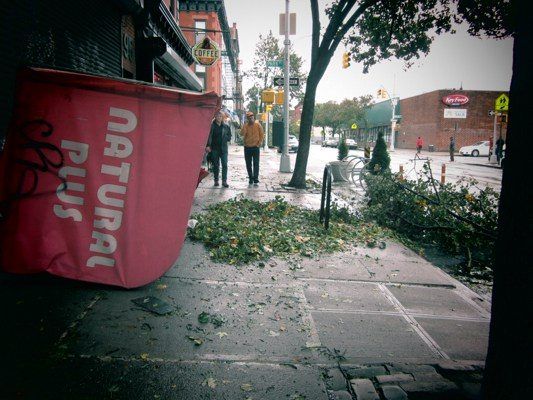
TRANSPORTATION
| Initiative | Milestones to complete by December 31, 2016
|
2016 milestone status
|
Milestones to complete by December 31, 2017
|
| Reconstruct and resurface key streets damaged by Sandy
|
Begin resurfacing work through three contracts funded by FHWA and FEMA in all five boroughs
|
Partially complete | › Start construction on eight additional FEMA and FHWA funded street reconstruction projects in Brooklyn, Manhattan, Queens, and Staten Island
› Start construction of two FEMA and FHWA funded Citywide street resurfacing projects
|
| Integrate climate resiliency features into future capital projects
|
Consult and coordinate with agency partners on how to further incorporate resiliency features into DOT’s Street Design Manual
|
Completed | Begin incorporating resiliency features into DOT’s Street Design Manual
|
| Install watertight barriers to protect movable bridge machinery
|
Repairs to Metropolitan Avenue Bridge substantially completed
|
Completed | Repair to remaining 12 movable bridges substantially completed
|
| Integrate resiliency into planning and project development
|
Consult and coordinate with agency partners on how to further incorporate resiliency features into DOT’s Street Design Manual
|
Partially complete | Develop adaptation strategies with other NYMTC members
|
| Call on non- City agencies to implement strategies to address climate change threats
|
Continue coordination with the MTA and PANYNJ
|
Completed | Continue coordination with the MTA and PANYNJ
|
| Plan for temporary transit services in the event of subway system suspensions
|
Revise Coastal Storm and Snow plans on an annual basis
|
Completed | Revise Coastal Storm and Snow plans on an annual basis
|
| Identify critical transportation network elements and improve transportation responses to major events through regular resiliency planning exercises
|
Hold annual tabletop exercise
|
Completed | Hold annual tabletop exercise
|
| Develop standard plans for implementing HighOccupancy Vehicle (HOV) requirements
|
Update and implement HOV restrictions and other traffic management strategies annually as part of the Coastal Storm and Snow plans review process
|
Completed | Update and implement HOV restrictions and other traffic management strategies annually as part of the Coastal Storm and Snow plans review process
|
| Construct new ferry landings to support private ferry services
|
› Construct and fit out barges for landings
› Complete Environmental Impact Statement (EIS), obtain permits, and install landings for the 2017 routes (Rockaway, South Brooklyn, and Astoria
|
Partially complete | Install landings for the 2018 routes for public Citywide Ferry Service (Lower East Side and Soundview)
|
| Expand the network of bus priority strategies on arterial highways
|
Develop a concept of operations for an extended HOV/bus lane on the LIE, in coordination with the State
|
Delayed | |
| Expand ferry services in locations citywide
|
› Construct and fit out barges for landings
› Complete EIS, obtain permits, and install landings for the 2017 routes (Rockaway, South Brooklyn, and Astoria)
|
Partially complete | › Launch the 2017 routes (Rockaway, South Brooklyn, and Astoria)
› Install landings for the 2018 routes (Lower East Side and Soundview)
|
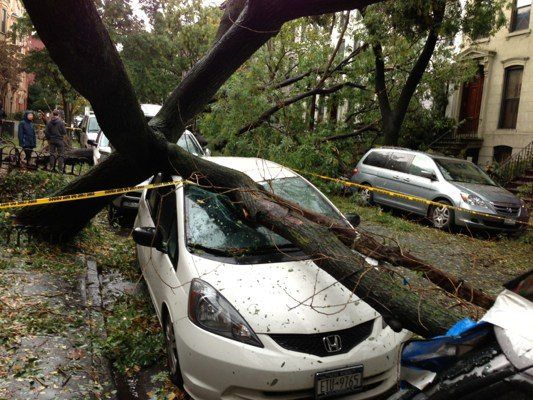
WATER + WASTEWATER
| Initiative | Milestones to complete by December 31, 2016
|
2016 milestone status
|
Milestones to complete by December 31, 2017
|
| Harden pumping stations
|
Begin design and advance agreement with the New York State Environmental Facilities Corporation’s Storm Mitigation Loan Program for all 43 qualifying projects, including 29 at pumping stations and 14 at wastewater treatment plants
|
Partially complete | Begin procurement of construction contracts for hardening projects
|
| Harden wastewater treatment plants
|
Begin design and advance agreement with the New York State Environmental Facilities Corporation’s Storm Mitigation Loan Program for all 43 qualifying projects, including 29 at pumping stations and 14 at wastewater treatment plants
|
Partially complete | Begin procurement of construction contracts for hardening projects
|
| Reduce combined sewer overflows (CSOs) with green infrastructure
|
› Start construction or fully complete construction on over 2,600 right-of-way green infrastructure projects
› Submit first two long-term control plans, which are due at the end of June 2016 pursuant to the current CSO Order
|
Completed | Submit remaining three long-term control plans by December 2017 pursuant to the current CSO Order
|
| Reduce combined sewer overflows with high-level storm sewers citywide
|
Start construction on four highlevel storm sewer projects at a total cost of $130M
|
Completed | Start construction on two high-level storm sewer projects
|
| Harden critical City-owned facilities
|
Continue to incorporate resiliency measures in repairs and capital projects
|
Completed | Continue to incorporate resiliency measures in repairs and capital projects
|
| Implement strategies to protect Brooklyn Bridge Park and DUMBO
|
Begin renovation of the Pier 5 uplands with sound attenuation berm, elevated landscape and lawns, rain garden swale, and rip rap East River revetment
|
Completed | › Complete landscaping for Pier 3 with resilient landscape, a hard surface flexible event space, hedge labyrinth, and lawn
› Finalize design of the Pier 2 Uplands and begin planning for Brooklyn Bridge Plaza
|
| Complete planned drainage improvements in Coney Island to mitigate flooding
|
› Complete Phase 1
› Start construction on Phase 2B
|
Delayed
Completed |
› Complete design for Phase 3A and start construction on Phase 3B (Coney West Project
› Complete Phase 2A
|
| Provide technical assistance to support Sea Gate in repairing Sandy-damaged infrastructure
|
Continue collaboration with the Sea Gate community
|
Completed |
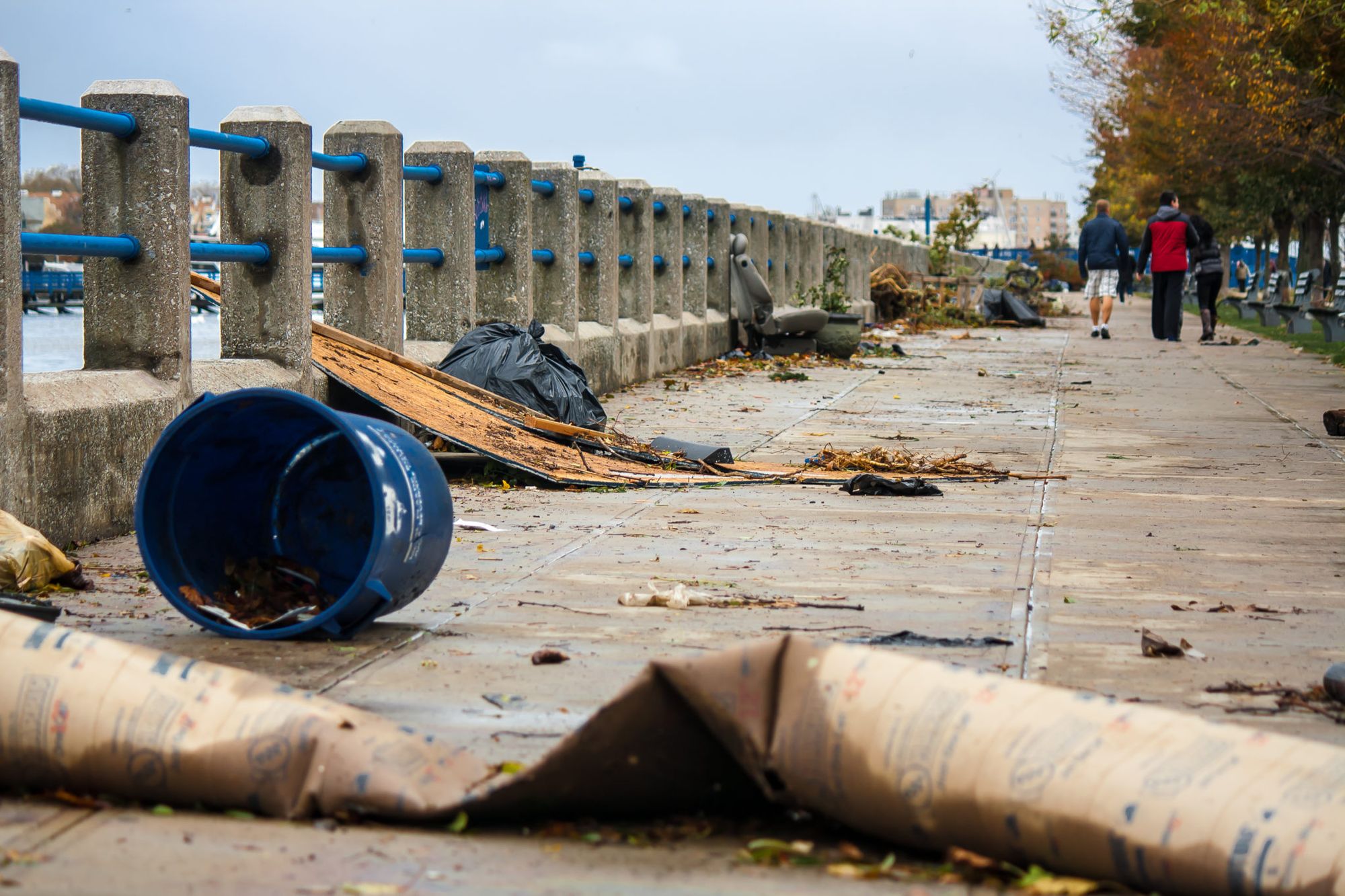
LIQUID FUELS
| Initiative | Milestones to complete by December 31, 2016
|
2016 milestone status
|
Milestones to complete by December 31, 2017
|
| Call on the federal government to convene a regional working group to develop a fuel infrastructure hardening strategy
|
› Work with NY State and the Department of Homeland Security to complete data collection and initial analysis as part of a regional resiliency assessment program focused on liquid fuel supply chain
› Release Columbia report on enhancing situational awareness for fuel supply chain resiliency
|
Completed | Complete the Department of Homeland Security regional resiliency assessment for liquid fuels
|
| Develop a reporting framework for fuel infrastructure operators to support post-emergency restoration
|
› Work with NY State and the Department of Homeland Security to complete data collection and initial analysis as part of a regional resiliency assessment program focused on liquid fuel supply chain
› Release Columbia report on enhancing situational awareness for fuel supply chain resiliency
|
Completed | Complete the Department of Homeland Security regional resiliency assessment for liquid fuels
|
| Work with Buckeye and New York State to safely build pipeline booster stations in New York City to increase supply and withstand extreme weather events
|
Continue to explore opportunities with Buckeye and NY State to enhance resiliency of the fuel supply
|
Completed | Continue to explore opportunities with Buckeye and NY State to enhance resiliency of the fuel supply
|
| Ensure that a subset of gas stations and terminals have access to backup generators in case of widespread power outages
|
Completed | ||
| Call on New York State to modify price gouging laws and allow flexibility of gas station supply contracts to increase fuel availability during disruptions
|
Coordinate with relevant State agencies on regulatory options and considerations to achieve this initiative
|
Partially complete | Call on relevant State agencies to implement regulatory modifications as appropriate
|
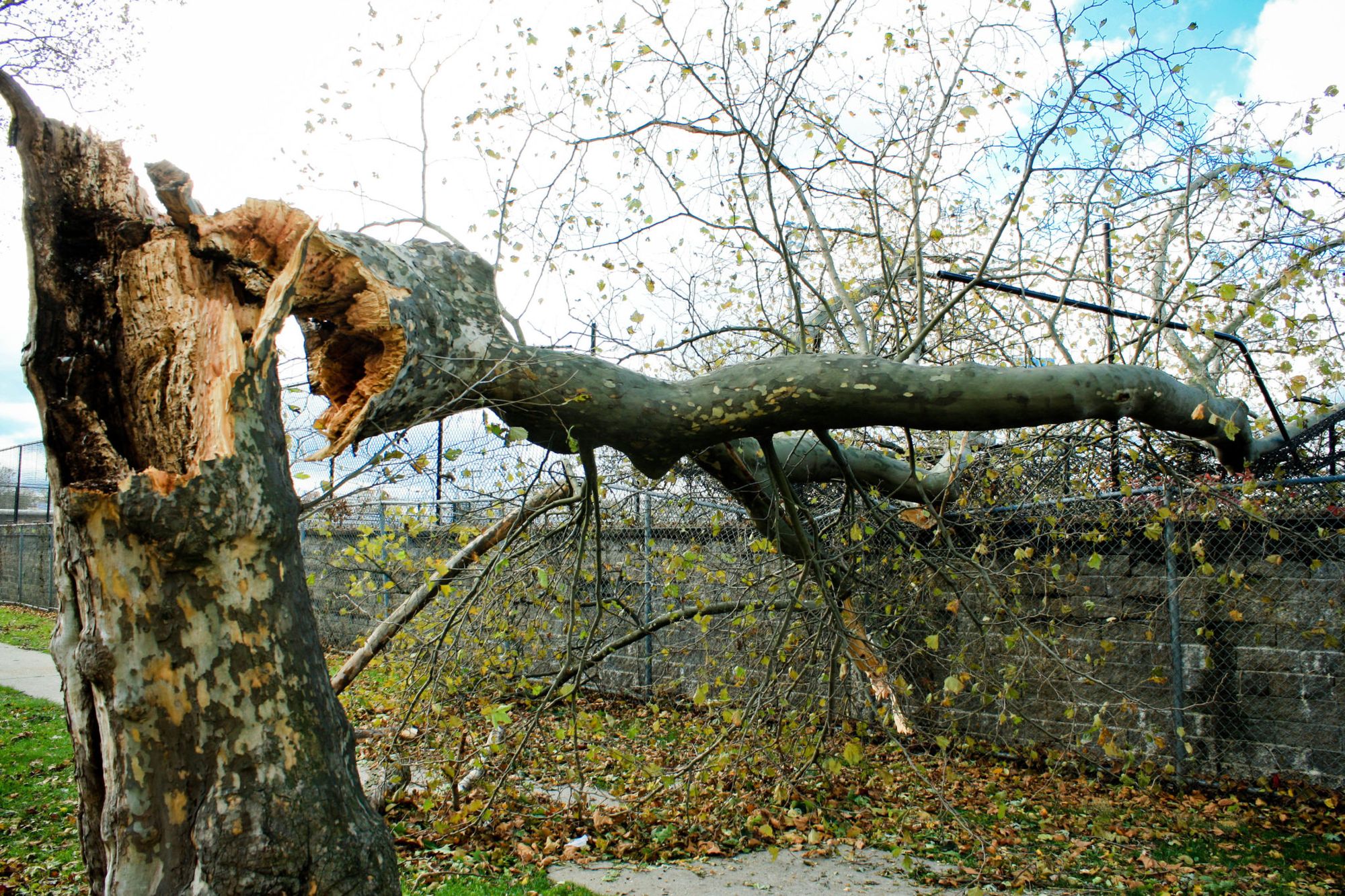
PARKS
| Initiative | Milestones to complete by December 31, 2016
|
2016 milestone status
|
Milestones to complete by December 31, 2017
|
| Restore city beaches
|
Rebuild the Rockaway Boardwalk from Beach 19 Street to Beach 39 Street in Fall and Winter of 2016
|
Partially complete | Complete all construction of Rockaway Boardwalk by Memorial Day 2017
|
| Expand the City’s greenstreets plan, including for Jamaica Bay
|
› Design the first phase of sites identified in 2015 study of parkland opportunities, approximately 60 parks
› Award contract for Brighton Beach (Department of the Interior’s (DOI) National Fish and Wildlife Foundation (NFWF) Coney Island Coastal Resilience Greenstreets Project)
|
Completed
Delayed |
› Continue to develop designs for sites in 2015 study of parkland opportunities
› Re-bid and award contract for Brighton Beach (DOI NFWF Coney Island Coastal Resilience Greenstreets Project)
|
| Fortify marinas and piers
|
Release design guidelines
|
Partially complete | › Incorporate design guidelines in the design of new and rehabilitated shoreline parks
› Release design guidelines
|
| Relocate or increase the resiliency of playgrounds and athletic fields
|
Continue to assess and upgrade DPR marinas and piers, as funding is made available
|
Completed | Secure funding for rebuilding of World’s Fair Marina
|
| Protect mechanical systems at major park facilities and buildings
|
Continue to assess and upgrade mechanical systems at major park facilities and buildings, as funding is made available
|
Completed | Continue to assess and upgrade mechanical systems at major park facilities and buildings, as funding is made available
|
| Move or protect critical operations centers
|
Continue to work towards flood protection and upgrades of critical operations centers, as funding is made available
|
Completed | Continue to work towards flood protection and upgrades of critical operations centers, as funding is made available
|
| Work with the Federal government to transform Jamaica Bay
|
Establish board structure
|
Completed | |
| Harden pumping stations
|
Begin design and advance agreement with the New York State Environmental Facilities Corporation’s Storm Mitigation Loan Program for all 43 qualifying projects, including 29 at pumping stations and 14 at wastewater treatment plants
|
Partially complete | Begin procurement of construction contracts for hardening projects
|
| Harden wastewater treatment plants
|
Begin design and advance agreement with the New York State Environmental Facilities Corporation’s Storm Mitigation Loan Program for all 43 qualifying projects, including 29 at pumping stations and 14 at wastewater treatment plants
|
Partially complete | |
| Harden or otherwise modify shoreline parks and adjacent roadways to protect adjacent community
|
Release design guidelines
|
Partially complete | › Incorporate design guidelines in the design of new and rehabilitated shoreline parks
› Release design guidelines
|
| Reinforce or redesign bulkheads in coastal parks
|
› Release design guidelines
› Continue to inspect waterfront parks and make repairs at newly identified sites
|
Completed | Continue to inspect waterfront parks, including Harlem River Drive (135- 145th Streets), Faber Park, Astoria Park, Fort Washington, Inwood Hill Park, and Whitey Ford Field
|
| Quantify the benefits of the city’s ecosystems and green infrastructure
|
Complete overall ecosystem benefits study
|
Partially complete | Publish and release report
|
| Map the city’s overhead utilities and street trees
|
Complete the Trees Count data collection | Completed | Complete the Trees Count data analysis
|
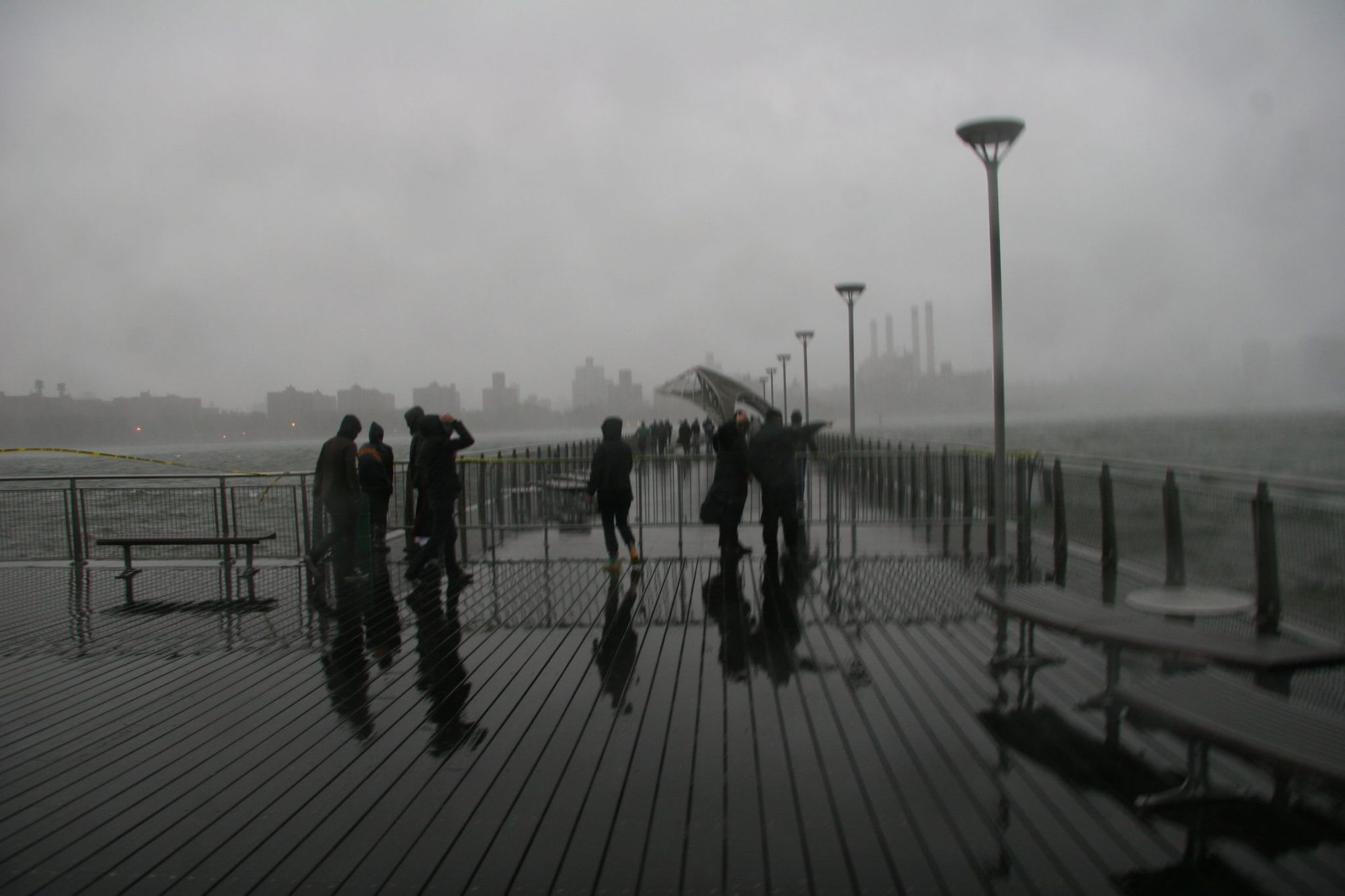
ENVIRONMENTAL PROTECTION + FOOD SUPPLY
| Initiative | Milestones to complete by December 31, 2016
|
2016 milestone status
|
Milestones to complete by December 31, 2017
|
| Develop a catalogue of best practices for storing enclosed hazardous substances in the 100-year floodplain
|
Complete Resilient Industry Study
|
Partially Complete | › Implement recommendations from the Resilient Industry Study
› Complete Resilient Industry Study
|
| Study the food distribution system to identify other prospective vulnerabilities
|
› Work with NY State and the Department of Homeland Security to complete a regional resiliency assessment program focused on the supply chain for critical commodities
› Complete food supply resiliency study
|
Completed | |
| Expand upon prior energy studies, to explore options for cost-effective, continuous power for the Hunts Point Food Distribution Center
|
Conduct feasibility study and identify preferred resilient energy pilot project
|
Partially complete | › Complete the study, and secure funds for implementation
› Secure permits and break ground on initial project elements › Receive Action Plan Amendment approval from HUD
|
| Call on the State legislature to pass City-sponsored legislation mandating electric generators for food retailers Food Supply
|
Pursue legislation with the State
|
Completed | |
| Continue to support the FRESH program to increase the number of full-line grocers in underserved neighborhoods
|
Open four additional approved projects for business
|
Partially complete | Approve additional projects for FRESH benefits and open approved stores
|
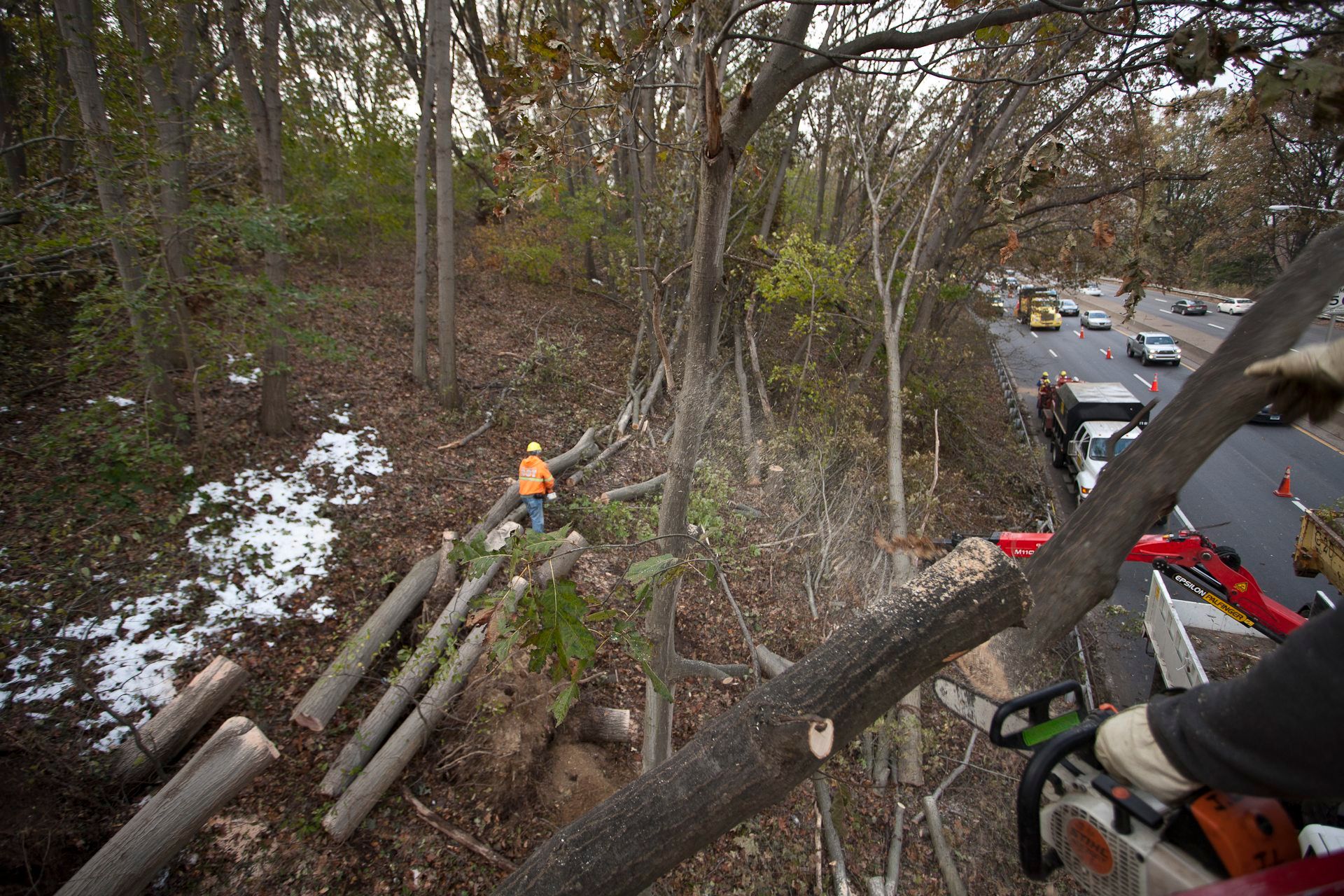
COASTAL DEFENSE
| Initiative | Milestones to complete by December 31, 2016
|
2016 milestone status
|
Milestones to complete by December 31, 2017
|
| Install armor stone shoreline protection (revetments) in Coney Island
|
Begin design on all priority locations
|
Delayed | Begin design on all priority locations
|
| Raise bulkheads in low-lying neighborhoods across the city to minimize inland tidal flooding
|
Begin design on all priority locations
|
Delayed | Begin design procurement on all priority locations
|
| Continue to work with the USACE to complete existing studies of the Rockaway Peninsula and implement coastal protection projects
|
Work with USACE in their effort to identify Tentatively Selected Plan and final General Reevaluation Report
|
Completed | Support USACE to complete review by the USACE Civil Works Review Board and submit the Chief’s Report
|
| Continue to work with the USACE to complete its Sea Gate project in Southern Brooklyn
|
Complete construction
|
Completed | |
| Install an integrated flood protection system in Red Hook
|
Submit application to FEMA for a $100M stand-alone project to advance to implementation
|
Delayed | Receive FEMA approval and begin procurement process for full project design
|
| Continue to work with Con Edison to protect the Farragut substation
|
Complete project, including installation of flood wall and deployable flood barriers
|
Completed | |
| Develop an implementation plan and preliminary designs for new Coney Island Creek wetlands and tidal barrier
|
Complete and release the Coney Island Creek Resiliency Study
|
Completed | Begin design on all priority locations
|
| Study opportunities along Coney Island Creek to generate economic activity and facilitate resiliency investments
|
› Complete and release the Coney Island Creek Resiliency Study
› Begin four sites in this area
|
Completed
Delayed |
› Begin design on all priority locations
› Pursue future funding through the U.S. Army Corps of Engineers to implement a flood barrier for Coney Island Creek
|
| Call on and work with the USACE to study and install local storm surge barriers at Newtown Creek
|
Secure commitment from the USACE for Newtown Creek to be a focus area in New York and New Jersey Harbor and Tributaries Study
|
Partially complete | Coordinate results of the local storm surge barrier evaluation with the USACE to inform future focus area studies in the New York and New Jersey Harbor
|
| Evaluate strategies to fund wetland restoration and explore the feasibility of wetland mitigation banking structures
|
Receive US Army Corps permits and start restoration work
|
Partially complete | Start earthwork and planting of the restoration site at Saw Mill Creek and make first credits created by the bank available for compensatory mitigation in NYC
|
| Call on and work with the USACE to develop an implementation plan and preliminary designs for a local storm surge barrier along the Gowanus Canal
|
Coordinate the Tide Barrier Study with the USACE to inform future focus area studies in the New York and New Jersey Harbor
|
Completed | Coordinate results of the local storm surge barrier evaluation with the USACE to inform future focus area studies in the New York and New Jersey Harbor
|
| Create an implementation plan for comprehensive flood-protection improvements on public and private property along the Williamsburg, Greenpoint, and Long Island City coastlines
|
Coordinate results of the local storm surge barrier evaluation with the USACE to inform future focus area studies in the New York and New Jersey Harbor
|
Completed | Coordinate results of the local storm surge barrier evaluation with the USACE to inform future focus area studies in the New York and New Jersey Harbor
|
| Call on and work with the USACE to study additional Sea Gate oceanfront protections
|
Continue to work with the State to implement its bulkhead project, in coordination with other future measures that are under development
|
Completed | Advance further protections through USACE Jamaica Bay plan
|
| Continue to work with the USACE to study strengthening the Coney Island/ Brighton Beach nourishment
|
Complete analysis for additional beach resiliency interventions in coordination with potential use of Corps dredge material as a cost saving measure
|
Completed | Identify funds for implementation of recommended beach resiliency measures and begin implementation
|
| Call on and work with the USACE to study Manhattan Beach oceanfront protections
|
Advance this protection through the USACE Jamaica Bay plan
|
Completed | Advance this protection through the USACE Jamaica Bay plan
|
| Call on and work with the USACE to study mitigating inundation risks through Rockaway Inlet, exploring a surge barrier and alternative measures
|
› Work with USACE to advance project into Feasibility Report stage
› Identify near-term and complementary projects to address sea level rise risks in and around Jamaica Bay
|
Completed | › Work with the USACE toward completion of Chief’s Report
› Advocate for the USACE to separate near-term and complementary projects to address risk of sea level rise in and around Jamaica Bay
|
| Implement citywide waterfront inspections to better manage the City’s waterfront and coastal assets
|
› Complete the first round of inspections
› Make inspection data available across City agencies through online waterfront facilities management database
|
Completed | Continue performing waterfront inspections, re-prioritizing agency assets, and assisting with capital budget planning based on the results of the inspections
|
| Study design guidelines for waterfront and coastal assets to better mitigate the effects of flooding
|
Release design guidelines
|
Partially complete | › Incorporate design guidelines in the design of new and rehabilitated shoreline parks
› Release design guidelines
|
| Evaluate soft infrastructure as flood protection and study innovative coastal protection techniques
|
› Complete on-going research
› Advocate for inclusion of additional nature-based features by the USACE as part of the complementary features of the recommended Rockaway Reformulation project
|
Completed | Support research initiatives with the Science and Resilience Institute at Jamaica Bay that evaluate soft infrastructure interventions for flood protection in Jamaica Bay
|
| Evaluate the city’s vulnerability to drainage pipe flooding and identify appropriate solutions to minimize those risks
|
Complete an initial evaluation of new measures for drainage infrastructure at the neighborhood scale, such as tide gates and check valves
|
Partially complete | Implement the recommendations as appropriate
|
| Work with agency partners to improve the in-water permitting process
|
› Launch waterfront permitting website and make available to public
› Continue to work with agency partners to streamline waterfront permitting
|
Completed | Continue to work with agency partners to streamline waterfront permitting
|
| Enhance waterfront construction oversight by strengthening the City’s waterfront permit and dockmaster units
|
Explore options to enhance waterfront permitting by increasing coordination between the SBS WPU and DOB
|
Completed | Develop enhanced technology capabilities for coordinated application review between SBS, DOB, and FDNY
|
| Call on and work with the USACE and FEMA to collaborate more closely on flood protection project standards
|
Continue to identify the USACE projects for which FEMA certification measures can be applied so that beneficiary communities can mitigate their flood insurance costs
|
Completed | Convene a formal meeting with FEMA to coordinate certification for the East Shore of Staten Island and East Side Coastal Resiliency projects, the most advanced projects that need this certification
|
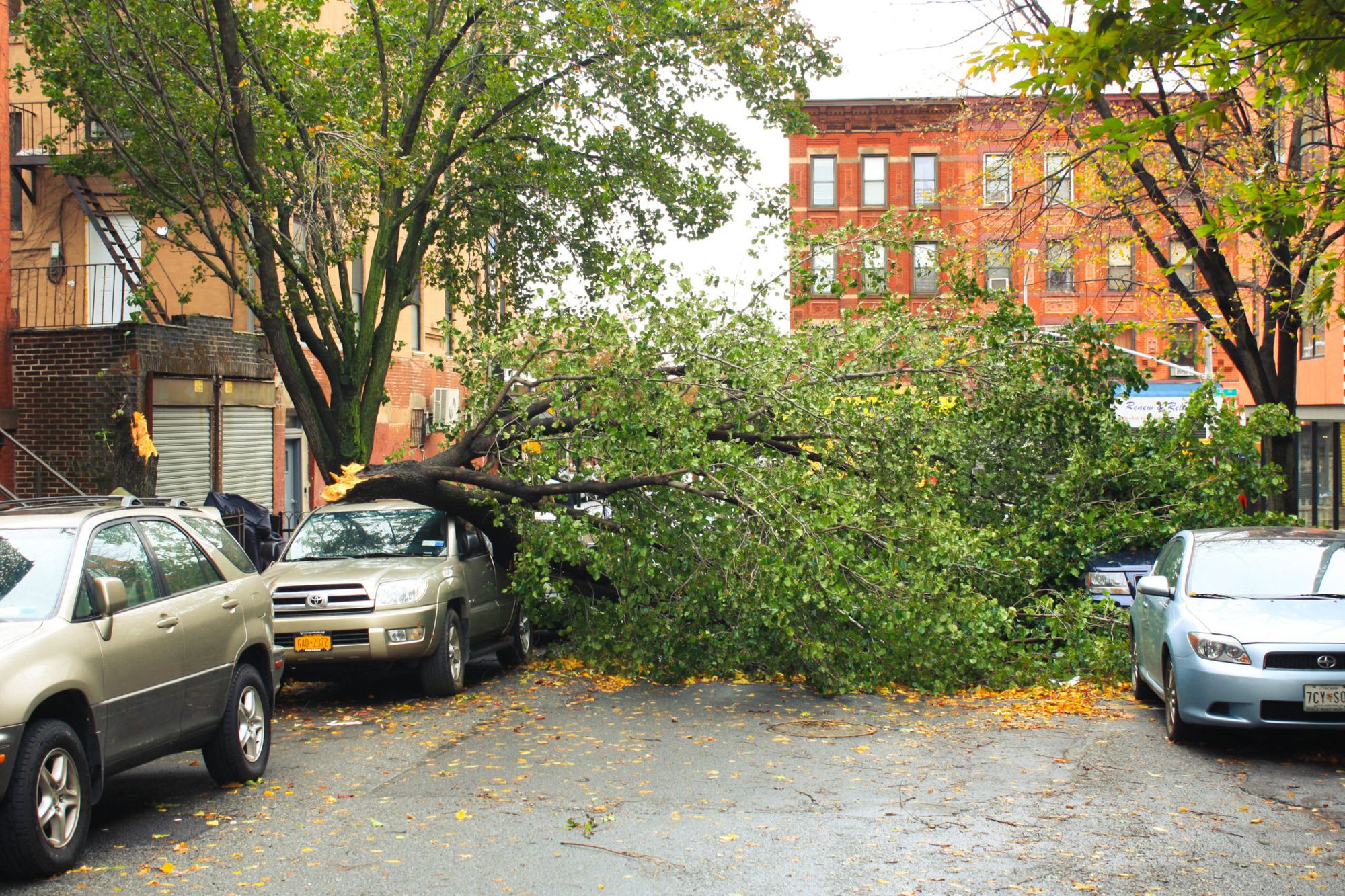
HEALTHCARE
| Initiative | Milestones to complete by December 31, 2016
|
2016 milestone status
|
Milestones to complete by December 31, 2017
|
| Require the retrofitting of existing hospitals in the 500- year floodplain
|
Complete the analysis of cost and benefits of reintroducing large building flood mandate legislation as it applies to hospitals and redraft proposed legislation as appropriate
|
Completed | Implement strategies for updated large building flood protection policies related to hospitals
|
| Support the NYC Health + Hospitals effort to protect public hospital emergency departments (EDs) from flooding
|
Finalize interim design plans for hardening of emergency department at Coney Island Hospital and begin construction
|
Partially complete | › Advance design at Coler, Bellevue, and Metropolitan
› Begin site work at Coney Island Hospital
|
| Require the retrofitting of existing nursing homes in the 100-year floodplain
|
Complete cost-benefit analysis of large building flood mandate legislation as it applies to nursing homes and redraft proposed legislation as appropriate
|
Completed | Implement strategies for updated large building flood protection policies related to nursing homes
|
| Require the retrofitting of existing adult care facilities in the 100-year floodplain
|
Complete cost-benefit analysis of large building flood mandate legislation as it applies to adult care facilities and redraft proposed legislation as appropriate
|
Completed | Implement strategies for updated large building flood protection policies related to adult care facilities
|
| Support nursing homes and adult care facilities with mitigation grants and loans
|
Complete assessment of eligible facilities and begin the design process
|
Completed | Complete design and work with FEMA to launch Phase II of the construction project
|
| Increase the air conditioning capacity of nursing homes and adult care facilities
|
Complete assessment of eligible facilities and begin the design process
|
Completed | Complete design and work with FEMA to launch Phase II of the construction project
|
| Harden primary care and mental health clinics
|
Identify funding to complete this initiative
|
Delayed | Dependent on available funding, develop a program to advance this initiative
|




